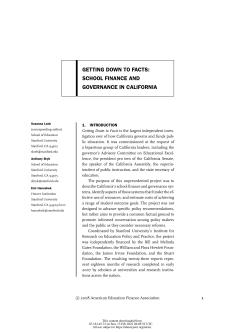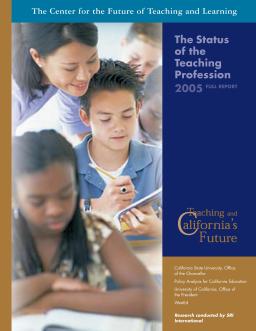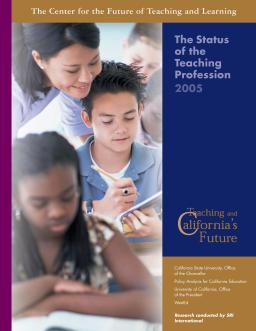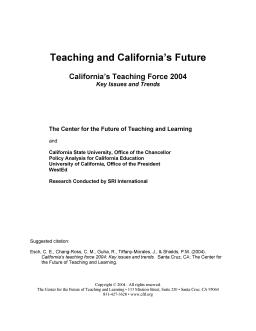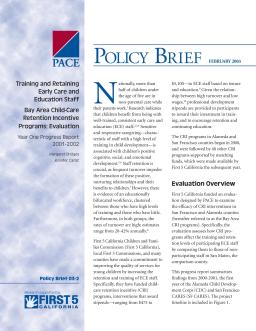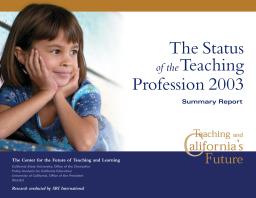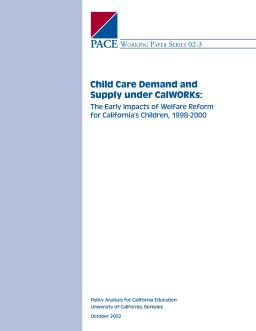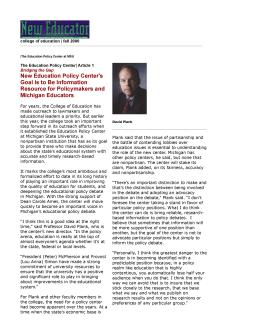School Finance and Governance in California
Published
Summary
Getting Down to Facts is an extensive investigation of CA's public education system commissioned by a bipartisan group of CA leaders. The project aimed to describe California's school finance and governance systems, identify obstacles hindering resource utilization, and estimate costs to achieve student outcome goals. The project resulted in 23 reports by scholars, which highlight that the current school finance and governance systems fail to help students achieve state performance goals, particularly those from low-income families. The reports provide a framework for assessing reform options.
Full Report
Published
Summary
The Teaching and California's Future initiative provides policymakers with data on the teacher workforce and labor market. The initiative's annual report details teacher development policies and their impact on teacher quality and distribution. The goal is to help policymakers make informed decisions about strengthening the state's teacher workforce.
Published
Summary
The quality of teaching and the need to expand California's ranks of excellent teachers demand urgent public discussion. We must attract the best and brightest to teaching, prepare them effectively, and support and retain them. Solutions require bipartisan leadership, not spin. This report presents the latest research and projections, highlighting that while some numbers are improving, we're likely to face severe shortages again soon and the pipeline for recruiting, preparing, and training teachers has substantial problems.
California’s Teaching Force, 2004—Key Issues and Trends
Published
Summary
California's aging teacher workforce will lead to a significant demand for teachers, with shortages particularly in special education and secondary education. The number of underprepared teachers in low-performing schools serving minority, poor, and ELL students is disproportionate. Budget cuts have reduced funding for recruitment and professional development programs, and California's induction system needs refinement. Curriculum-based professional development programs have mainly targeted elementary school teachers, neglecting the training needs of secondary teachers.
Bay Area Childcare Retention Incentive Programs Evaluation—Year One Progress Report, 2001–02
Published
Summary
The First 5 California Children and Families Commission has funded the Childcare Retention Incentive (CRI) to improve the quality of early care and education (ECE) staff training and retention. An evaluation funded by First 5 California assesses the efficacy of CRI programs in San Francisco and Alameda counties. This report summarizes the preliminary findings from the first year of the Alameda Child Development Corps and San Francisco CARES programs, which examine whether CRI recipients are more likely to participate in training and be retained compared to non-participating ECE staff.
Summary Report
Published
Summary
This report argues that the state of California needs to prioritize better education for all children with a sustained long-term investment of resources and leadership. Despite political upheaval and fiscal problems, there is a consensus for better education. The authors suggest that the issue requires a response as intense and sustained as the state's response to natural disasters, and calls for a system of teacher development to ensure all teachers have the necessary knowledge and skills to meet academic standards.
The Early Impacts of Welfare Reform for California's Children, 1998–2000
Published
Summary
This report examines the effects of welfare-to-work and childcare capacity building on the childcare system in California, prompted by changes in the childcare system and welfare reform. The study was requested by the California Department of Social Services, and this paper provides an overview of the findings.
New Education Policy Center's Goal Is to Be Information Resource for Policymakers and Michigan Educators
Published
Summary
Michigan State University's College of Education has established the nonpartisan Education Policy Center to provide lawmakers and educational leaders with accurate, research-based information to improve the state's educational system. With the support of the university's resources, the center aims to play an important role in deepening the policy debate and bringing about improvements in the system. The center was established due to a lack of systematic communication between researchers and policymakers in Michigan.
